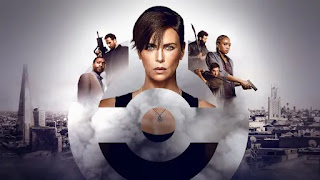Living forever is all very well but what would you
talk about? That’s one of the more interesting questions posed by The Old
Guard, a superhero movie from Netflix which is a cut above most in the
genre.
There are hints of Gilgamesh, the first superhero,
in this story of four immortals who have been together for years. These eternal
warriors travel the world doing good, helping the less fortunate, saving the
oppressed, but always below the radar.
Andromache (Charlize Theron) and her companions
take sensible precautions. They never allow themselves to be seen, or
photographed, and they never go back to the same place twice. The one time they
allow themselves to break their rules there are consequences.
They are being hunted by big pharma in the shape
of nasty genius Merrick (Harry Melling). He is only interested in monetising
immortality which means capturing them and essentially vivisecting them for
ever. Incidentally, they can’t die but they do feel pain making this a less than
pleasant prospect.
The sensible thing to do would be to lie low and
wait it out – unlike them Merrick won’t live forever. But a new immortal has emerged,
Nile (Kiki Layne), who needs to be protected and brought into the group which
means they need to go back out into the world and risk capture themselves.
Based on the comic book by Greg Rucka and Leandro Fernandez,
The Old Guard is more thoughtful than we have come to expect from a
superhero movie.
There’s not a lot of dialogue they’ve pretty well
said all they need. The most recent recruit Booker (Matthias Schoenerts) joined
in the Napoleonic wars, while the other two members Nicky (Luca Marinelli) and
Joe (Marwan Kenzari) were on opposing sides in the Crusades. Their big
excitement is a guessing game with Charlize Theron and baklava – it’s better
than it sounds, trust me.
That gives the story an interesting dynamic; more
than most action movies this is about a group dynamic moving as a well-oiled machine.
There is no fake heroism or macho posturing; they know what they are doing and
why they are driven to do it.
Director Gina Prince-Bythewood does a terrific job
of telling this story. Her previous films such as Love and Basketball (2000)
and The Secret Life of Bees (2008) all feature characters with rich
interior lives. None of that has been left behind just because they have superpowers.
This is the first superhero movie I can think of in a long time where you have
a real sense of who these people are. There is as much effort in the baklava
sequence, for example, as there is in an action set piece.
The action scenes incidentally are superbly
staged. Rather like Patty Jenkins’s handling of the Amazon warriors in Wonder
Woman (2017), there is an emphasis on the aesthetics of combat rather than
the brutality. The action is no less exhilarating but the tendency to shoot the
characters in full figure brings an elegance to the proceedings. I shudder to
think what these scenes would have been like handled by Zack Snyder or Michael
Bay for example.
Like almost all Netflix movies The Old Guard
is a shade on the long side, but it is still a thrilling an exciting story,
very well told. The ending also sets things up very nicely and I suspect it won’t
be too long before we see them all again.






